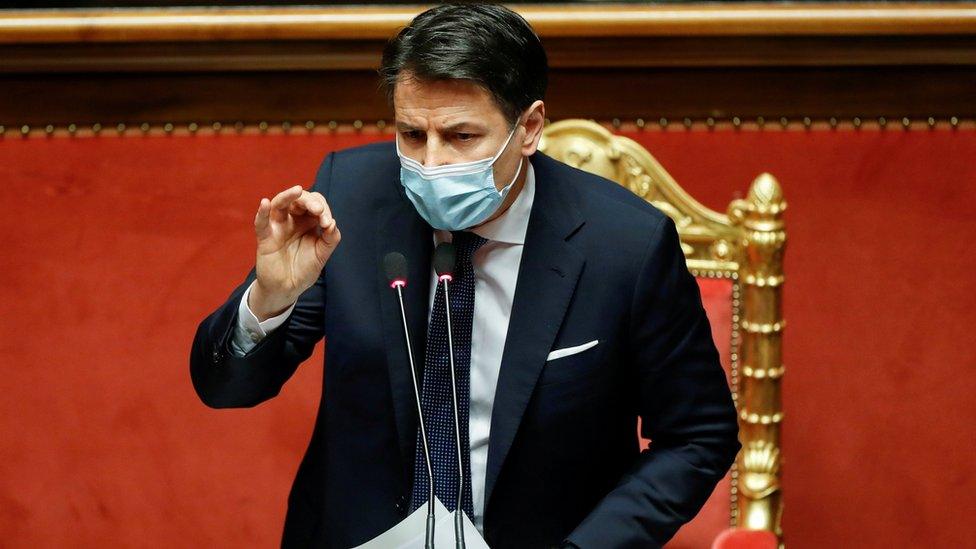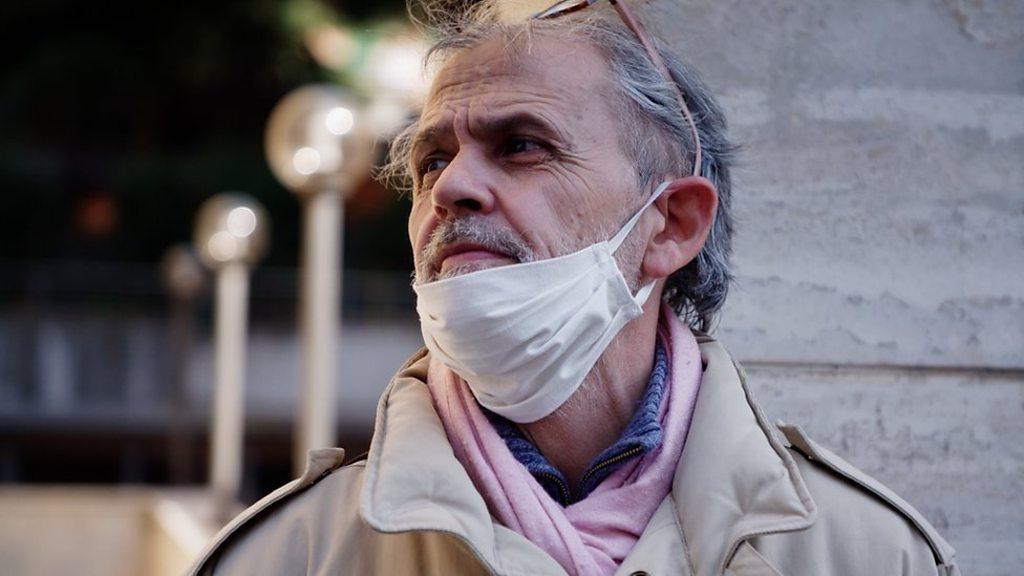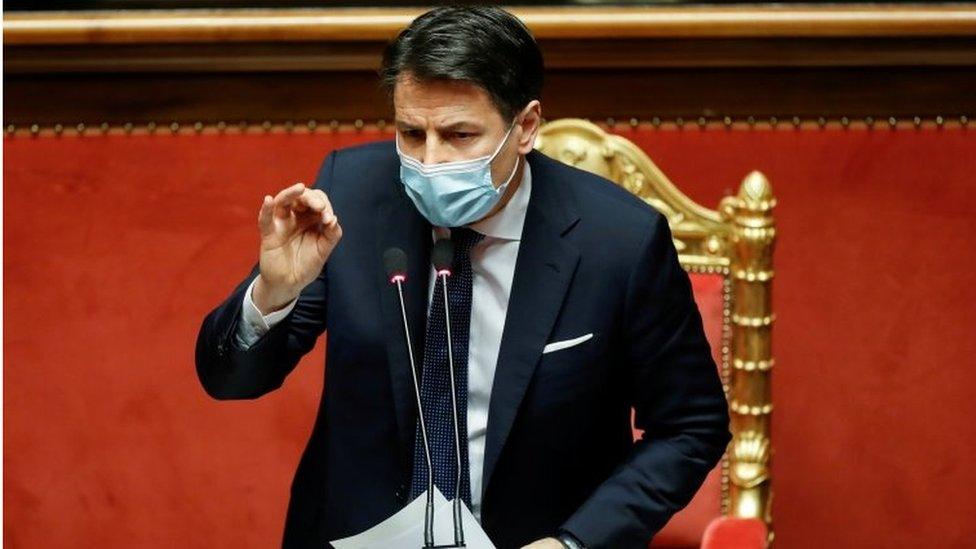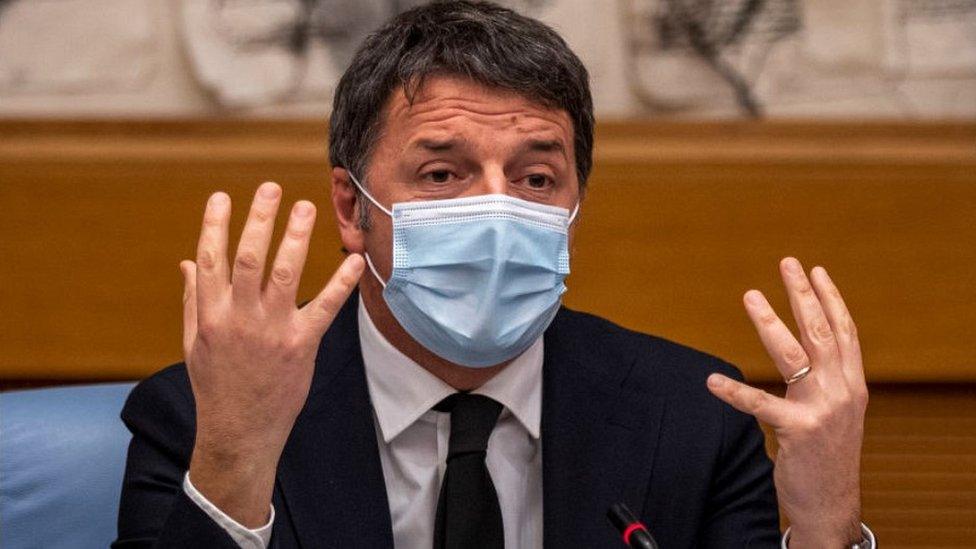Italian PM Conte resigns in split over Covid response
- Published

Mr Conte hopes to form a new and stronger government after losing his majority in the Senate
Italian Prime Minister Giuseppe Conte has resigned - and it is not clear if he will be able to form and lead a new coalition government.
Parties are divided over spending in the coronavirus crisis, in which more than 85,000 Italians have died.
Mr Conte met President Sergio Mattarella, who may ask him to form a stronger government. Last week he lost his Senate majority.
But someone else could become Italy's PM, or a snap election could be called.
The law professor, who has headed coalition governments since 2018, tendered his resignation to the president. And now Mr Conte is discussing the political crisis with Senate president Elisabetta Casellati.
President Mattarella is expected to spend two days in talks with party leaders, as it is up to the president to decide the next move.
How did this come about?
The centrist coalition government was plunged into crisis two weeks ago when former PM Matteo Renzi pulled his small, liberal Italia Viva party out of it. He said he would only return if Mr Conte accepted a list of demands.
Mr Conte survived a vote of confidence in the lower house, the Chamber of Deputies, last week. He then won a Senate vote, but without an absolute majority.
The lack of a majority would restrict government business - hence the political shake-up.
Mr Renzi's main objection was to Mr Conte's plans for spending €209bn (£186bn; $254bn) of EU recovery funds - part of a €750bn EU rescue for the Covid crisis.
How the lockdown last year left some Italians struggling to get food
Mr Renzi says EU funds should be invested in promising sectors like digital and green technologies, and wants MPs, rather than technocrats, to decide on the allocations. But he also wants more investment in the embattled health service.
Italy, now mired in recession, was at the epicentre of the pandemic in Europe last year.
Mr Renzi governed Italy in 2014-2016, but currently his Italia Viva party is polling below 3%.

'The worst possible time'

And so Italy's 66th government since World War Two comes to a close. A country of seemingly perennial political crises has chosen the worst possible time to face another - in the grip of a pandemic that has killed more than 85,000 Italians and unleashed the worst economic collapse in decades.
That's why Giuseppe Conte may manage to come back with a new revamped government, arguing the need to avoid the turmoil of fresh elections at such a difficult time. Added to that, polls suggest an early vote would be won by the far right. So Mr Conte is hoping that the threat of losing their seats might tempt enough centrist politicians to jump the opposition ship and join a reformed coalition.
Italy's 29th prime minister since the war is hoping to return as… Italy's 29th prime minister since the war. But his opponents are circling. And he won't have much time to convince parliament that he can become the new, stronger comeback kid.

So what next?
There are several options:
Mr Conte could be asked to stay on as PM, but he would need to revamp some of his policies and make some new appointments to win back a parliamentary majority
He could persuade some non-aligned senators to join a new coalition if Mr Renzi refuses to support a Conte-led government
The main parties in the outgoing coalition - anti-establishment Five Star (M5S) and the centre-left Democratic Party (PD) - could agree to serve under a new PM, perhaps with one or two other parties
Mr Conte could persuade one or more right-wing parties to join a new coalition led by him. But that option is seen as unlikely, as right-wing parties are ahead in opinion polls, so a snap election would favour them.
Mr Conte, an independent technocrat, has led two very different, successive governments.
For 15 months he headed a coalition between M5S and the far-right League, whose leader Matteo Salvini pulled out in a failed bid to force elections.
Since then he has led a four-party, centre-left coalition dominated by M5S and the PD.
Related topics
- Published8 April 2020

- Published23 January 2021

- Published14 January 2021
